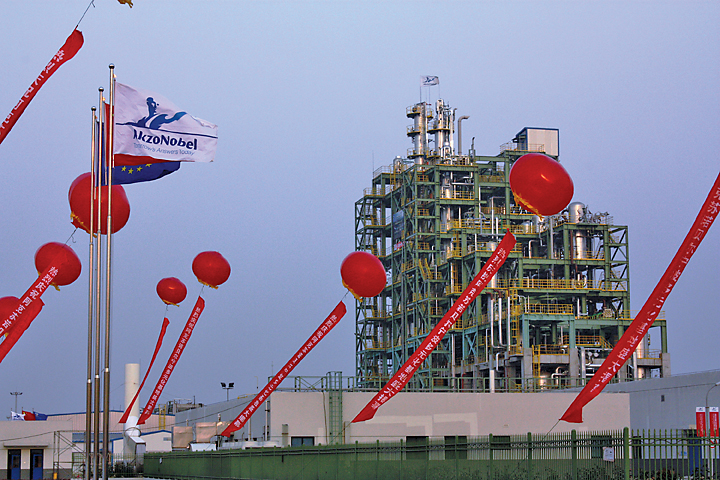Four of the world’s leading chemical companies recently began production at major new facilities in China.
AkzoNobel officially opened its €275-million (US$434-million) Ningbo multi-site in China in November. Occupying a 124-acre (50-hectare) plot, the company’s Functional Chemicals business is producing chelates in Ningbo. The same business also planned to start up new ethylene amines and ethylene oxide factories at the site before the end of the year, with an organic peroxides facility due to come on stream in 2011. The products produced in Ningbo will serve a number of markets including the building and construction, cleaning and detergents, food preservation, oil, personal care and pulp industries.
AkzoNobel currently employs around 6,500 people in China, where it now has 27 manufacturing locations.
Dow Corning and Wacker Chemie have opened their joint integrated silicone manufacturing site in Zhangjiagang, Jiangsu province. The facility will serve fast-growing demand for silicone materials in China and Asia. The combined $1.8-billion investment, covering 1 million sq. m. (10.7 million sq. ft.), is China’s largest facility of its kind and is among the world’s biggest and most advanced integrated silicone production sites. The integrated site includes a siloxane plant and a pyrogenic silica plant, both of which are jointly owned by Dow Corning and Wacker. The site also features finished silicone production plants which are owned and operated independently by each company.
Siloxane and pyrogenic silica are key ingredients in the manufacture of finished silicone products. Silicone-based materials are used in nearly all sectors of China’s economy, including automotive, construction, cosmetics and personal care products, electronics, power generation and distribution, solar energy and textiles.
“While the economic environment has changed a lot since we broke ground here four years ago, our commitment to and faith in China’s future has never changed,” said Dr. Stephanie Burns, chairman and CEO of Dow Corning Corp. “Throughout China and in many other parts of Asia, we see an increasing number of manufacturers using silicones to improve the performance of their products. Our investment in this site significantly enhances our ability to meet that need and to spur growth in many key industries in this region.”
Rhodia Silica has begun production at a high-performance silica plant in Qingdao. Rhodia’s highly dispersible silica is used principally in the production of energy-efficient tires. The company says its technology decreases the tread’s rolling resistance, resulting in a 5- to 7-percent reduction in fuel consumption by light vehicles. Located on a 17-acre (seven-hectare) site, the plant adds more than 30 percent of additional capacity to Rhodia’s global silica production network.
“We provide our customers with a unique technology and the corresponding volumes required to meet the increasing regulatory demands for tire labeling around the world,” said Tom Benner, president of Rhodia Silica. “The site will enable us to profit fully from Asia’s significant development potential and reinforce our leadership position in this market.”
